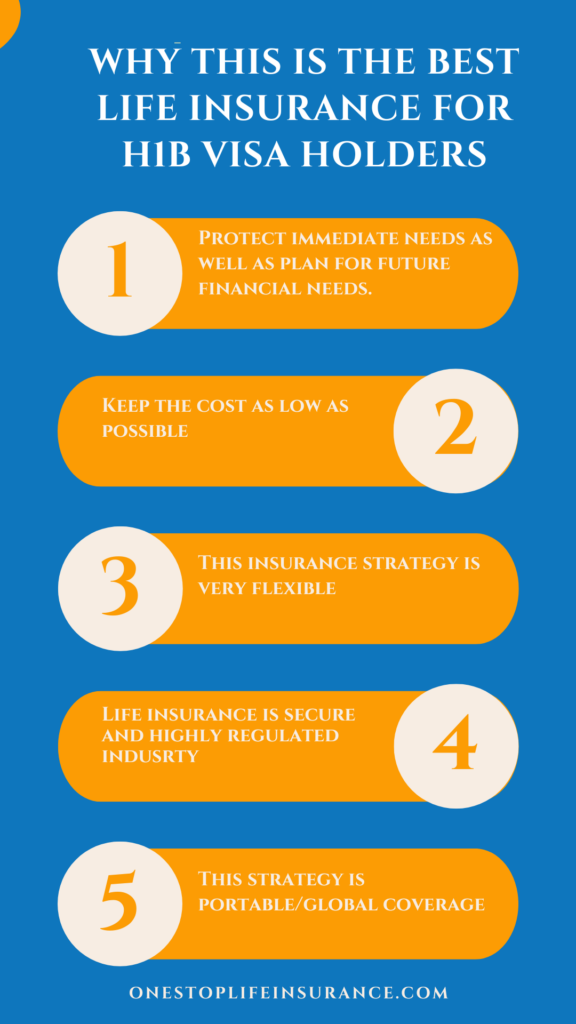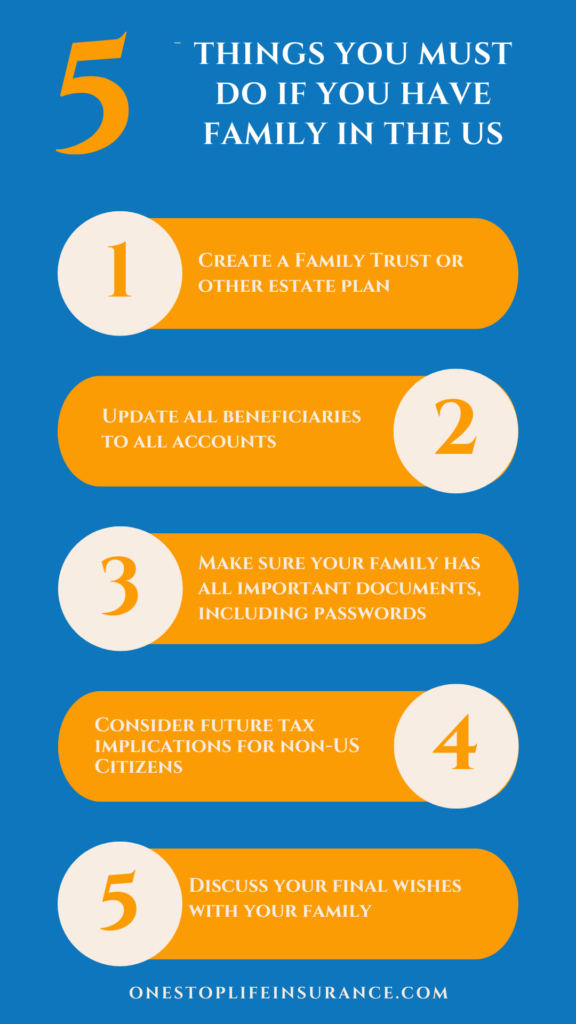Get the Best Life Insurance for H1B Visa Holders: so powerful
You know you need to get life insurance, but where to start? We get it and this is why we have created this recommendation guide to help you understand your options and choose the best life insurance for H1B visa holders.
Table of contents
What is the best life insurance for h1b visa holders: a policy or a strategy?
Why is this strategy so powerful
Requirements to get insurance in the US
Things you MUST do if you have family in the US
Before jumping into the core of this topic, we would like to advise you that we specialize in life insurance for foreign nationals. We understand the challenges faced and make it our mission to make the process of getting coverage as easy as possible.
This guide is intended for you if you are planning on staying in the US permanently, or at least for the foreseeable future. Life is unpredictable and sometimes things are beyond our control, but if you know that you are moving back to your country of origin in the next year, for example, there might be a better suitable option for you.
We would like to consider this article as a “level two”. If you are unsure what is life insurance and do not have a general understanding of the process, we would recommend you start with:
What is the best life insurance for H1B visa holders (a policy or a strategy)
As the name suggests, we believe there is not a best policy but a best strategy when looking into life insurance as a visa holder.
Please note, that situations are different and we may make a different recommendation based on your circumstances. However, we are strong believers that looking at life insurance, as described below, covers a lot of needs as economically and beneficially possible.
Okay, so what is the best option for life insurance?
In our experience, having been in this industry for over 2 decades, it is best to have a mix of 2 separate policies. One of the policies is to be term life insurance with living benefits, while the other is to be a permanent life insurance policy.
Let’s dive a bit deeper and explain why combining Term and Permanent Policies.
Term Life Insurance with Living Benefits
Term life insurance is relatively affordable and you can buy “a lot” of coverage for a fixed price. It is best used to address temporary needs for high coverage (cover the mortgage, supplement our income while the kids are financially dependent on us, etc)
Here is an example of the cost:
The rate for a 37-year-old male in above-average health, non-tobacco:
$1,000,000 – 20-year term – $54.27 per month.
But, what is term life insurance with living benefits, and why is this a recommended option?
Typical, or plain term life insurance, offers a death benefit only if the primary insured passes away. However, if you are diagnosed with any serious illness, and are still alive, there is zero help.
Life insurance with living benefits addresses this problem. It allows you to use your death benefit while you are still alive, if you are diagnosed with a common health condition, such as heart attack, stroke, or invasive cancer.
Essentially, you do not have to die for the policy to pay out.
How does this work?
Living benefits are called accelerated benefit riders. If you are diagnosed with a qualifying medical condition (all eligible conditions will be listed in the policy), you can access your death benefit to help you with any current financial need you may have. The money will be taken from the death benefit, and it will reduce it.
This is the first part of the H1B visa life insurance strategy. For more information on companies and requirements, we have created a separate guide on life insurance with living benefits for visa holders.
What we want you to keep in mind, is that the rate we shared above is for a policy with living benefits. The same company offers a product without this option and the price is only $4.50 less per month!!
Now to the second part of the strategy puzzle:
A permanent policy with a cash value growth focus
Term insurance will end and leave you without any coverage. This is not a problem, as long it protects your family when they need it the most.
However, term insurance can not address a permanent need we all share: the cost of dying. We know this is harsh to say, but dying in the US can be expensive. Recently, we had a client of ours, who lost his father, had to pay for his funeral, and also bought a plot for his mother, so they could be buried together. The cost for this was $50,000.
Another thing you must account for as a non-US citizen is where you would like to be buried and whether your family can attend the funeral. As an H1B visa holder, you would need to consider what will happen to your family, should you pass away. In other words, would their visa be terminated? Will they have to move back to their country of origin, or choose to stay illegally?
The cost of dying is a permanent need and we recommend it be addressed with permanent coverage.
The second part of the life insurance strategy for visa holders is to set up a separate permanent life insurance policy (this can be done in different ways).
A permanent policy offers permanent coverage. In other words, if designed properly, you will not outlive your life insurance contract.
Another key benefit a permanent life insurance policy offers is the ability to build cash value. This means that you are essentially building cash that you can access at any point. Furthermore, many of our clients have set up a Life Insurance as Retirment Planning for Visa Holders. In other words, they are able to build cash value within the policy and supllement their retiment or other financial needs.
What we want you to remember from this section is:
- Look at your needs
- Always cover temporary needs with temporary coverage and permanent needs with permanent insurance
- Most young adults, have both types of needs and therefore need 2 types of insurance.
P.S. Life Insurance can have many aspects to it. This is why, we created 2 separate guides to help you avoid some of the mistakes and get answers to the most common questions received by non-US citizens over the years.
Why is this strategy so powerful for visa holders?
To us, this is the most important part of the article when deciding on life insurance as an H1B visa holder. A well-structured life insurance policy can make a big difference in your and your family’s lives.
This strategy is powerful because it addresses more than one need while maximizing the use of your dollars.
Let us explain.
Protect immediate coverage needs as well as plan for future financial needs.
- Term insurance is cheap, you can buy the coverage you need and not overpay for insurance. In other words, you can cover the need to protect your family.
- The second component is permanent insurance. Depending on the design, it can be used to supplement your term coverage and build cash value.
Cash value in life issuance is something that the wealthy have been using for centuries. It has numerous tax advantages. In addition, cash value life insurance offers unparalleled protection of your funds.
Oftentimes, we work with clients who decide to put a few extra funds into a permanent insurance policy for the benefit of growing funds that are potentially income tax-free.
To stay on topic, we will end with that. However, if you want us to go in-depth about the benefits of cash-value life insurance, simply reach out to us. We will customize a plan for you and answer any questions you might have. This way, you can see if this is something that makes sense to you and your particular situation.

Keep the cost as low as possible
The last thing every one of us wants is to be insurance-poor. By separating the policies, you are not overpaying for the cost of insurance on a permanent plan.
Do you remember the example above? $1 million in term insurance costs about $54 per month. If looking at the same converge into a permanent plan, it could cost you over $500 per month for a properly designed policy. The sad part of this is that the “extra” $450 will not be growing as efficiently for you and will be applied to the cost of insurance.
This type of insurance is also flexible
In other words, as you age, you can decide if you would like to keep the built-up funds for yourself and use them while alive or leave them as an increased death benefit to your family. Please note, that insurance is at-will participation. In other words, should you change your mind and decide you no longer need the coverage, you may cancel at any time.
Life insurance is secure
Life insurance is a highly regulated industry. Carriers are required to follow many guidelines and comply with tax as well as cash-on-hand regulations. Per an article written in Forbes:
“Insurance is a trillion-dollar industry in the United States, and the life insurance sector is one of its largest and most important components.”
This strategy is portable and offers global coverage
If your plans change and you do end up moving abroad, your life insurance will cover you worldwide. This gives our customers great peace of mind. While on this topic, please make sure you check with your employer or HR what will happen to the funds in your 401K if you move abroad and how can access it.
Requirements to take this option in the US as an H1B visa holder
You must be physically present in the US to apply and accept the policy
There is just no exception here. The companies require you to be here, to start the application process. In addition, they may require you to be in the US for a certain amount of time.
The different companies have different requirements for the length of stay in the US. Some will ask for 12 months, while others will require you to be in the US for a minimum of 3 or even 5 years before they can offer you the best rate.
You need to work in the US
As a non-permanent resident of the US, companies will need to find a financial connection to justify having coverage. Working in the US will signal stronger ties to the US. It also allows them to confirm you are paying taxes in the US and it is not a matter of any money laundering or something else.
Also, if you have not received or are unable to obtain a Social Security Number, we have created a guide on life insurance with ITIN.
Otherwise, qualify for coverage
What we mean by that is that they will still ask about your health and lifestyle. They will possibly require you to complete a medical exam in the US. Please note, that we will walk you through the process and answer any questions you might have.
Things you must do if you have family in the US
Since we are on the topic of planning for the financial future of our families, we felt it was very appropriate to turn your attention to 5 things you must do. Some you may have already done or know about, others may be new to you. The goal is to give you a comprehensive view of the financial picture and decide which is the best way to protect your future.

Create a Family Trust
We are strong believers that this is one of the first things that you should do. Every state’s laws and every situation is different. However, one thing is for sure:. If an accident happens and you and your spouse die at the same time, the court will decide who willtakeg care of your children.
Not only that, but in some states, the state can sell your assets through probate, collect the necessary fees, and then distribute the proceeds to your estate or guardians of your minor children.
Having a plan, such as a trust, is an essential part of the estate planning process for anyone living in the US, but it is even more important to immigrant families.
The bottom line is that if you do not have a plan in place, you are relying on the state system to make the best judgment for your loved ones. This could be not only emotionally damaging to your children but financially devastating as well.
Update all beneficiaries to all accounts
Oftentimes, we have open bank accounts with various banks, retirement accounts with previous employers (by the way, we can help them combine them into one), etc. Make sure all of the accounts have designated beneficiaries, when possible, and ask what happens to the funds if you pass away.
Make sure your family has all important documents, including passwords
Now, this may sound obvious, but a large number of people do not know their spouse’s phone password, let alone any other financial information. They need to know things like the name of the financial institution,
- Your account number with them
- Possibly the best phone number to get in touch with them.
At times of need, you need to make sure that this information is readily available for them to access.
Consider future tax implications for non-US Citizens and as US Citizens (if you decide to become one)
This is a big one! The topic is very complicated. By all means, we do not want to provide you with tax advice, since we are not experts in this field, but here is some information to consider:
- Are you planning on becoming a US citizen? If yes, do you know you may have to pay taxes on your worldwide assets or income?
- Also, given the current US debt, most economist predict that taxes will increase in the future.
- Are you planning on living in the US, or another country? What will be your retirement assets taxed at?
- If you have income from other countries, do you know if that income can be exempt from US taxation under different treaties, or it will be subject to tax?
As we said, the topic is very complex, however, the key is to start planning. One step at a time can help you ensure you have the major aspects covered.
Discuss your final wishes with your family
This is always a tough discussion to have. However, avoiding it will not make it disappear, quite the opposite. Make sure you set a time to discuss your final wishes with your family. Let them know if you want to be buried in the US or your home country, and whether would you like to be cremated or not.
In conclusion,
When it comes to the best life insurance for H1B visa holders, we believe it is a personalized strategy focusing on addressing the needs of global citizens. This ensures that life insurance serves as a multifaceted safety net, offering protection for your family in the event of your passing, a critical illness diagnosis, or when financial support is required during your retirement years.
We view this approach as a win-win-win, addressing your immediate and future needs comprehensively. If you want more information or want us to review individual circumstances, please reach out. We’re here to assist you in making informed decisions about your financial security.
We trust you’ve found this article informative and valuable. If you have any further questions, please do not hesitate to contact us.
Thank you!
